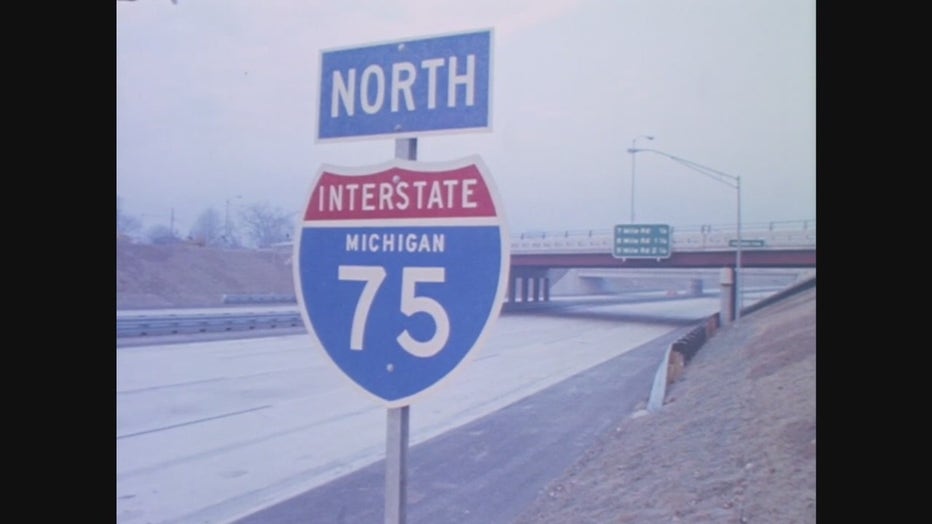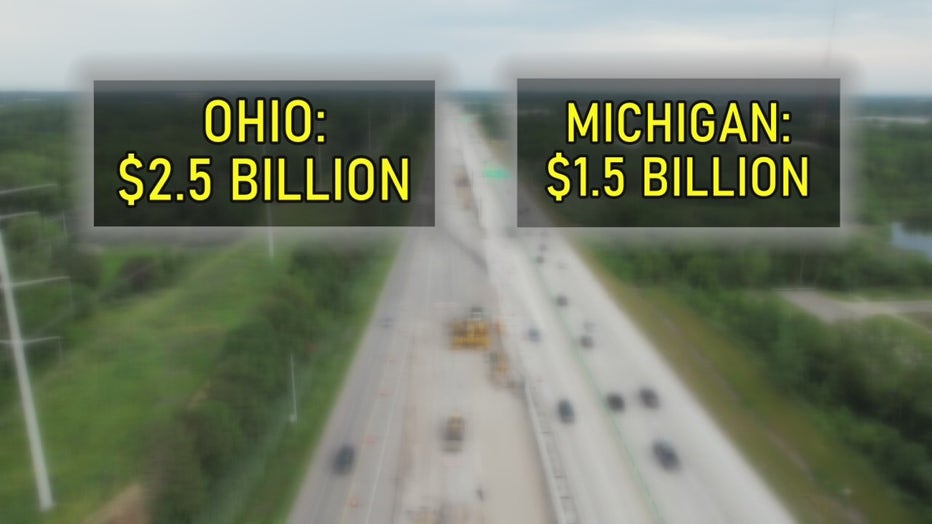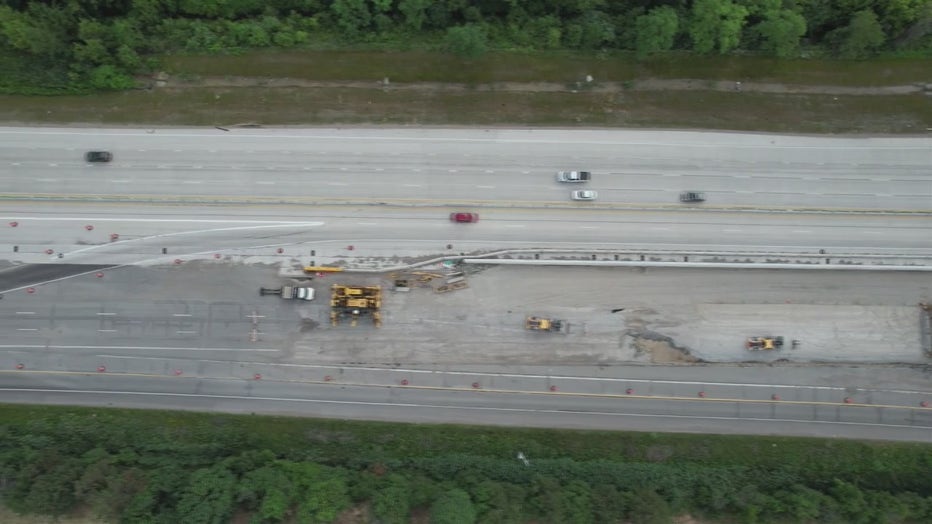What will it take to really fix Michigan's roads?
The ongoing struggle of fixing the damn roads in Michigan
According to the Reason Foundation's highway report, Michigan ranks 47th for its poor infrastructure and pavement condition. So what will it take to finally fix the roads?
FOX 2 (WJBK) - Michigan is home to the Motor City – and Woodward was the first paved concrete road in the country. So how can the state be rated 47th in the country when it comes to roads?
"I think there is a real need to evaluate the roads that we are maintaining," said Michigan Rep. Ranjeev Puri (D), the chair of the House Transportation Appropriations Committee. "Are they being used?"
Puri thinks Michigan has thousands of miles of roads and not enough money to fix them, and that it's time to put the state's roads on a diet by only putting money into the most traveled roads and closing the others – finally letting them crumble away for good.
Current Gov. Gretchen Whitmer is known for promising to "fix the damn roads." Much like many governors who came before her.
But we’re still waiting.
Ohio, however, did just that. Instead of protests and political mudslinging – in 2019, when Ohio Gov. Mike Dewine wanted to boost his state's road budget, the process went as smoothly as their roadways.
In part 1, FOX 2 went to Ohio and got some answers as to why their roads are so much smoother than Michigan's. In part 2, we dug deeper into what it will take to fix the crumbling roads.
Michigan has been so behind in road funding.
Recent studies show it would take $3.9 billion, annually, to fix the entire state’s infrastructure. Try selling that to Millennials and younger generations who aren’t car crazy and delay even getting their driver's licenses.
And while we’re at it, what about those drones that are supposed to replace trucks? We’ll come back to those points, but time to go down memory road – pun intended.
"When I was a kid, everyone always gave Michigan a hard time about roads," said Eric Oudsema, the Michigan Department of Transformation's (MDOT) transportation technician supervisor. "This is not anything new, (but) I feel like our roads are being built better now than they ever have been."

Oudesma has been working in MDOT's road lab for about 20 years – and claims our technology has come a long way.
"Some of the old pieces of equipment was basically dropping a needle in to test our asphalt," he said. "Now we are artificially aging it and we're using very nice computerized controlled material to make sure it meets national standards."
But when it comes to road funding, sadly, nothing has changed over the decades. According to the Reason Foundation's highway report, Michigan ranks 47th for its poor infrastructure and pavement condition.
You can blame the budget. Compared to Ohio, Michigan spends $1 billion less a year on its roads.

"We are doing lifecycle about the life of the pavement, and whichever pavement is the least expensive at this point in time is the one that is selected for paving," said Jason Gutting, MDOT's bureau of field services director. "But they are still designed the same."
"There is a pizza chain that says ‘Better ingredients better pizza’. I think that is a big part of it," said Matt Bruning with Ohio's Department of Transportation (ODOT). "You get what you pay for."
In Ohio, the average highway is completely replaced about every 50 years. It may cost more to construct the infrastructure – but the lanes of road last a lot longer and are also quicker and cheaper to fix.
"You have to construct a good road to be able to maintain good roads – so if you construct a bad road, maintaining is going to be really, really hard," Bruning said.
When the pavements start to break down in Ohio, ODOT does what they call a "mill and fill." They take off a little over an inch and replace the top layer of the roadway, and it’s about as good as new.
"I think we are doing the best we can with the dollars we have afforded to us," said MDOT's Chief of Operations Greg Brunner.
According to Brunner, MDOT was forced to implement an "asset management approach." Instead of focusing on the worst roads, crews work to extend the life of the decent ones.
Which are short-term fixes that make motorists feel like it is orange barrel season all year long.
"Of course, there's a lot more projects we like to do," Brunner said. "But, again, we are being as financially mindful of using the dollars in the right way in order to do the right fix at the right time."
Whitmer tried to fix the damn roads, but in 2019, lawmakers killed her 45 cent per gallon gas tax.
So the next year, the governor came up with a new plan – borrow $3.5 billion over 5 years, which is less than half of what her gas tax would have brought in. And the money only tackled state highways, not the crumbling crisis we see on county, township and city streets.
In a couple of years, when that bond money runs out, Michigan will not only be in debt, but the state still won’t have enough funding to fix the rest.
Federal funding boosts have helped, but by law, a majority of the money goes to state highways. The remaining 25% has to be split between more than 600 city and county road agencies, which already receive the smallest allocation of the fuel tax.
"Beidges and roads are not Republican or Democratic," Whitmer previously said. "They are an absolute essential."
But unless you ask lawmakers, or even potential voters, to reach into their pockets – then it is one roadblock after another.
FOX 2: Would you be willing to pay for a toll road, or higher gas taxes, or pay more?
"No, we are taxed to death as it is. Why would I want to pay more?" said Brian Heaton, a Michigander who lives near the Michigan-Ohio border.
If voters like Heaton approved former Gov. Rick Snyder’s gas tax increase in 2015, Michigan wouldn’t be in a road funding crisis right now.

Snyder was eventually able to get a gas tax increase without going to voters, which helped boost funding a little bit. But our fuel tax is among the lowest in the nation – even our sales tax on the gas doesn't go toward our roads.
"The funding strategy is needed as a long-term fix. Because it has been missing, you are seeing that more on the road conditions that you drive on," Gutting said.
But a long-term road funding proposal has been nearly impossible because of Michigan's Constitution. Unlike other states, for a bill to pass, the house and senate need 2/3 of the lawmakers to vote yes – or a super majority.
And if the constitution has to be amended, or there is a significant tax increase, it must also be approved by the voters. Whitmer's 2019 gas tax proposal didn't even get close.
So why did it only take a week for Ohio’s legislature to pass a hefty gas and diesel tax increase? There, it doesn't have to go to the voters and only takes a simple majority vote.
"At the end of the day, you get what you pay for. The harsh economic reality is Michigan pays the least of any peer state on per-mile maintenance of roads," Puri said. "You get what you pay for. We are not investing in the maintenance of the current transportation system – if we want a road system that exists, if we want it to get better, we have to figure out how to increase revenue in the state."
As the chair of the House Transportation Appropriations Committe, Puri took the lead this year on MDOT’s budget plan, and made clear that there is no one magic solution. The state will have to make roads a priority – creating a new revenue source and pull more money from other state funds.
To get the most bang for our buck, Puri is pushing to spend millions on pilot programs – including charging motorists a mileage tax. Instead of paying a per gallon gas tax and a flat registration fee to fund roads, drivers would be charged for miles traveled, like a toll. The user fee would tackle the gas tax loss from a growing number of EV owners.
"Toll roads? forget it – were not paying those," said Warholak Tire Manager Steve Beydoun in Detroit.
When it comes to the mileage tax, critics are worried about their privacy because data would be collected via GPS.
However, Puri believes ignoring the changing needs of our population is like ignoring a sinkhole in the middle of the road.
Young people aren’t in any hurry to get their driver’s license anymore, let alone a vehicle of their own – another reason Puri wants to put our roads on a diet. By eliminating the roads rarely used, the state can improve the quality of those traveled most.
"We have some money invested in a lab to study the materials that are being used to go into our roads, making sure that we're using the latest science to build roads as efficiently as possible that can last as long as possible as well," Puri said.
Much like Ohio.
But what if we didn’t have to rely on costly infrastructure?
Puri wants us to try and go "where there are no roads," he said.
An aerial mobility pilot program would study whether it was more effective to move people and cargo by air, depending on drone hubs for deliveries and E-bikes to get around.
"The reality right now though is that we are facing a $3.9 billion annual shortfall. So it really is finding what is politically viable to make sure we can pass the number votes, and get the governor's signature," Puri said.
If we, in Michigan, are ready to put our money where our potholes are, we could finally fix the damn roads – paving the way into a future where our roads will rival Ohio’s in smoothness and reliability.
"The highways are getting much better, but roads to homes and residential streets is worse," said Mack Dodd, another Michigan resident. "It's bad."
FOX 2: So would you be willing to pay more so you don't have to pay more for (repairs)?
"Whatever they need, let's get it done," Dodd said.
Read/watch part one of FOX 2's Michigan roads investigation here.
Michigan lawmakers are currently voting on the state's $81 billion budget. Part of the budget is still being directed to pilot programs, including the road dieting concept – which is now going to be called "Complete Streets." That program, if it passes, research will determine which roads are used the most and worth saving.
But to explore charging motorists that mileage tax instead of a gas tax, the Senate wants to now use federal dollars for that study, and FOX 2 was told an application has been submitted. Once it is approved, the state budget heads to the governor to be signed.
FOX 2 Detroit reached out to Whitmer multiple times for an interview for this story but did not receive any response.


